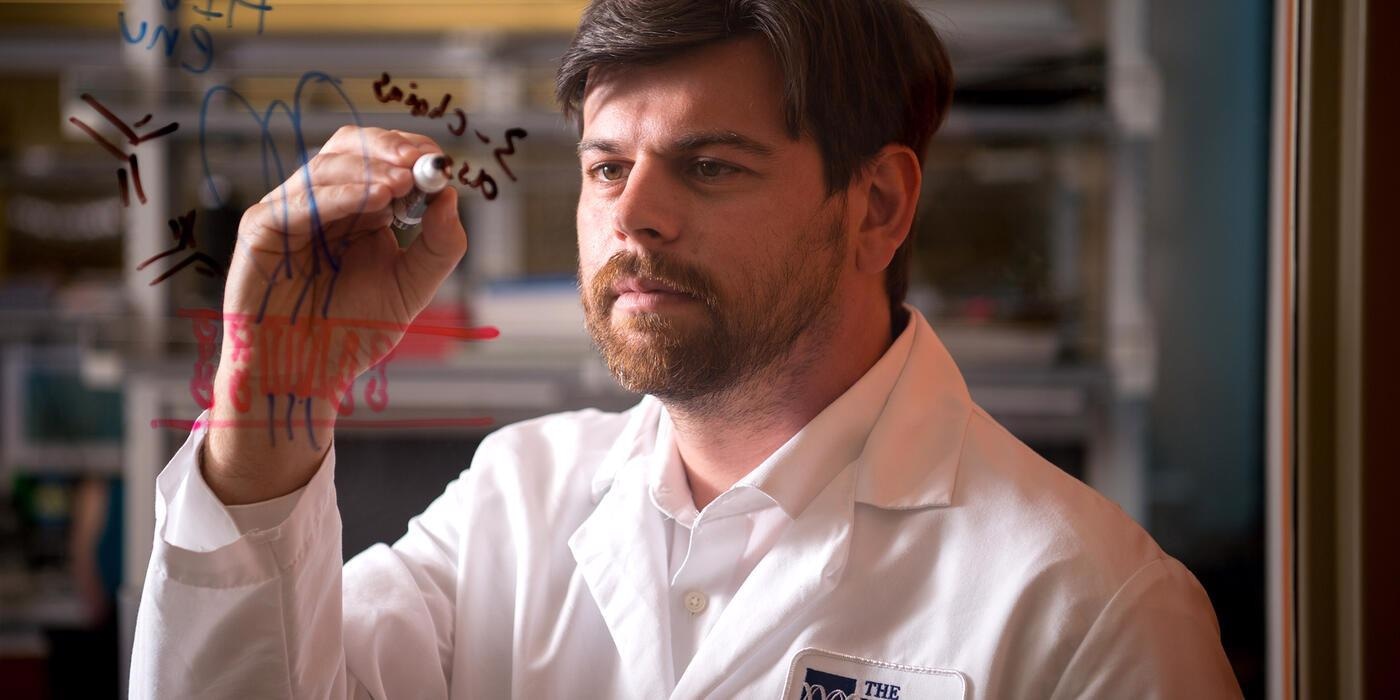The first generation of COVID-19 vaccines has been very effective; however, they do have certain limits. Their effectiveness can diminish without a booster shot, and they may be less effective against certain variants.
 Dr. Dan Kulp (Image Credit: The Wistar Institute).
Dr. Dan Kulp (Image Credit: The Wistar Institute).
At present, researchers at The Wistar Institute have created a more targeted vaccine that, in animal experiments, exhibited broader, stronger and more resilient protection in a single, low dose.
The vaccine integrates three technologies — self-assembling nanoparticles, immune focusing and DNA delivery — into a single unit for the first time. Besides its other advantages, the vaccine can be kept at room temperature, rendering it potentially easier to transport to remote or developing areas than current mRNA vaccines, which necessitate dedicated cold storage.
This is among the first next-generation vaccines that will have more advanced features and broader protection.
Daniel Kulp, Ph.D., Study Corresponding Author and Associate Professor, Vaccine & Immunotherapy Center, The Wistar Institute
The study, “Nucleic acid delivery of immune-focused SARS-CoV-2 nanoparticles drive rapid and potent immunogenicity capable of single-dose protection,” has been published in the journal Cell Reports.
Current vaccines comprise an unmodified receptor binding domain of SARS-CoV-2 spike protein. The new vaccine comprises a rationally designed receptor binding domain using computational and structure-based design approaches. The engineered receptor binding domain obstructs ‘immune distracting’ sites and can thus stimulate stronger levels of protective, neutralizing antibodies.
Scientists then employed naturally self-assembling proteins to develop nanoparticles that exhibit these highly engineered immunogens. By organizing themselves into structures that look like an actual virus, the nanoparticles are more easily detected by the immune system and moved to the germinal centers, where they trigger B cells which generate protective antibodies.
Using nucleic acid vaccine delivery technology resembling mRNA, the nanoparticle vaccine is encoded in DNA and supplied to cells thus providing genetic instructions for the body to form the immunogen internally. This is an advance on traditional vaccines that have to be produced in dedicated factories via complex vaccine production processes.
Contrary to other vaccines, Dr. Kulp observed that one benefit of the DNA platform is that it does not need refrigeration, and it can also be rapidly reformulated to target new variants.
In animal trials, scientists learned that the DNA-delivered immune-focused nanoparticle vaccine created much higher levels of neutralizing antibodies compared to the vaccine that was not immune-focused.
A difficulty with current vaccines is that neutralizing antibodies decline over time.
Daniel Kulp, Ph.D., Study Corresponding Author and Associate Professor, Vaccine & Immunotherapy Center, The Wistar Institute
The nanoparticle vaccine created reliable responses after a single immunization for up to 6 months in mice, contrary to what is happening with present-day SARS-CoV-2 vaccines in people.
The decisive test for SARS-CoV-2 vaccine candidates is the defense against death in SARS-CoV-2 challenge experiments. The scientists discovered that in a lethal challenge model, 100% of mice that received the immune-focused nanoparticle vaccine were safeguarded from death with a single low dose. Most mice that received the standard, non-immune-focused vaccine expired within 10 days of the challenge.
The vaccine review was carried out in both wild-type mice and mice that were genetically engineered to replicate human immune systems, he stated.
Even without being upgraded, the immune-focused vaccine exhibited a comparable level of antibody production to Delta, and other variants, Kulp stated. That is partially because of the immune focusing method itself, he observed; in obstructing parts of the receptive binding domain for the purpose of hindering non-neutralizing antibodies, it also obstructs many of the areas impacted by spike protein mutations. Studies on the Omicron variant are ongoing.
Scientists are seeking financial backing to commence human trials of the vaccine.
Co-author David B. Weiner, Ph.D., executive vice president, director of the Vaccine & Immunotherapy Center, and the W.W. Smith Charitable Trust Professor in Cancer Research, at The Wistar Institute, said the vaccine could offer a necessary step forward to enhance protection against COVID-19.
Current vaccine effects on reducing transmission of SARS-CoV-2 variants of concern including Delta and Omicron could be improved for their breadth of protection as well as their immune potency.
David B. Weiner, Ph.D., Study Co-Author, Executive Vice President, and Director of Vaccine & Immunotherapy Center, The Wistar Institute
“This study demonstrates that using a nucleic acid approach combined with in vivo structural assembly of a glycan immune-focused nanoparticle drives single protection and neutralization against diverse variants of concern in a dose-sparing formulation. Additional studies of this vaccine approach for SARS-CoV-2 appear timely and important.”
Co-authors: Kylie M. Konrath, Kevin Liaw, Yuanhan Wu, Xizhou Zhu, Susanne N. Walker, Ziyang Xu, Neethu Chokkalingam, Nicholas J. Tursi, Mansi Purwar, Emma Reuschel, Drew Frase, Benjamin Fry, and Ami Patel from Wistar; Katherine Schultheis, Igor Maricic, Viviane M. Andrade, Kate E. Broderick, Laurent M.P.F. Humeau, and Trevor R.F. Smith from Inovio Pharmaceuticals; Himanshi Chawla and Max Crispin from the University of Southhampton; Jianqiu Du and Alan Moore from Indiana University; Jared Adolf-Bryfogle and Jesper Pallesen from the Institute for Protein Innovation; Matthew Sullivan from the University of Pennsylvania; and Christel Iffland from Ligand Pharmaceuticals.
The study was supported by: Wistar Coronavirus Discovery Fund, CURE/PA Department of Health grant SAP# 4100083104, COVID/PA Department of Human Services grant SAP# 4100089371, NIH/NIAID CIVICs grant 75N93019C00051, Wistar SRA 16-4/Inovio Pharmaceuticals, Indiana University.
Journal Reference:
Konrath, K. M., et al. (2022) Nucleic acid delivery of immune-focused SARS-CoV-2 nanoparticles drive rapid and potent immunogenicity capable of single-dose protection. Cell Reports. doi.org/10.1016/j.celrep.2022.110318.